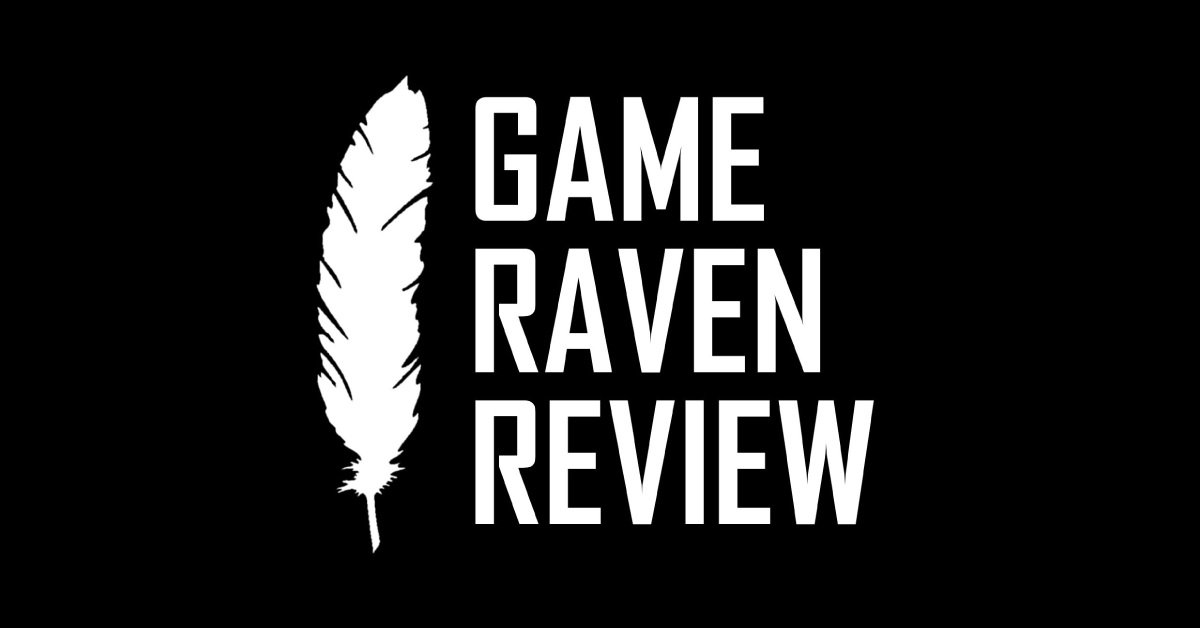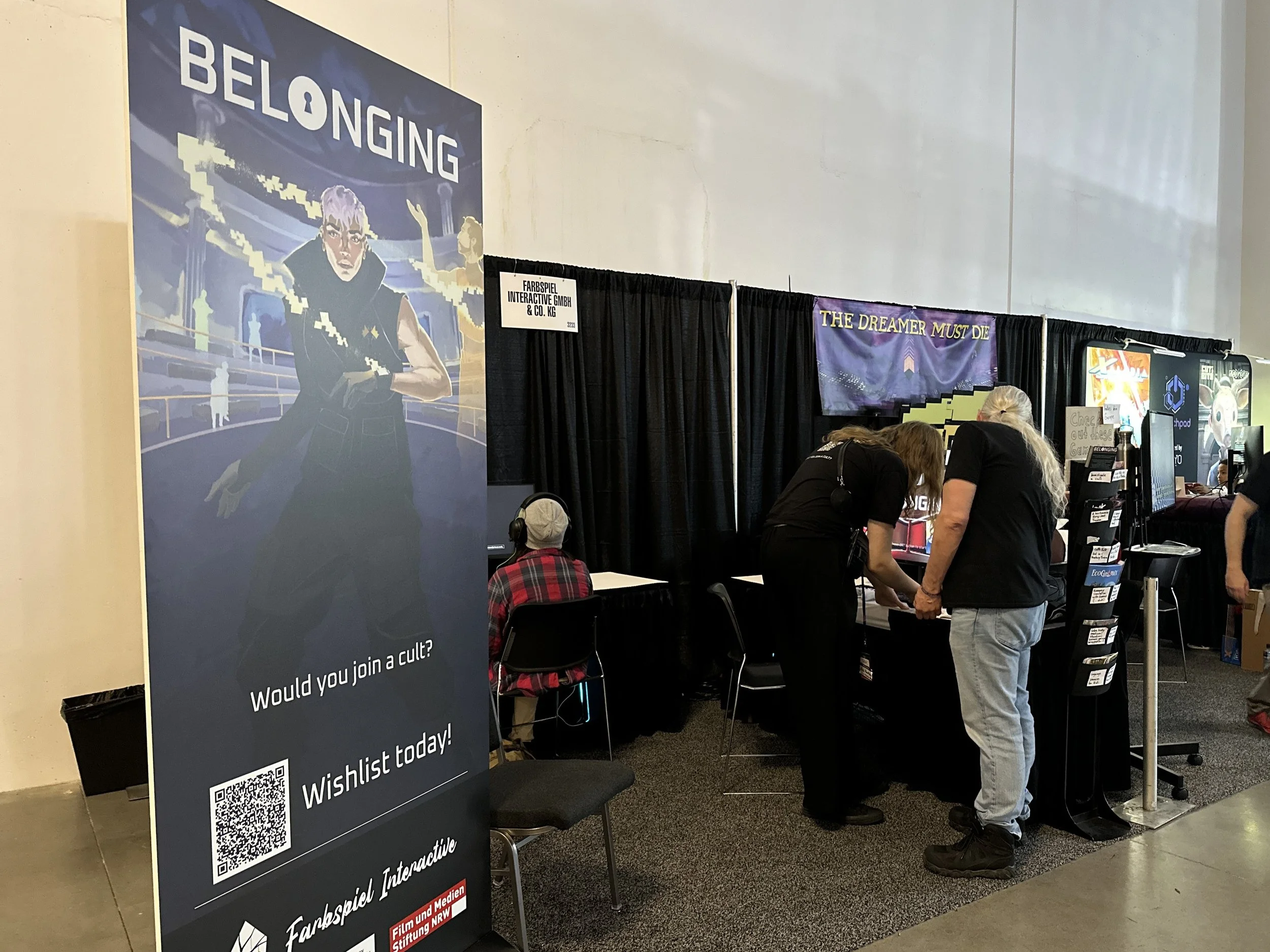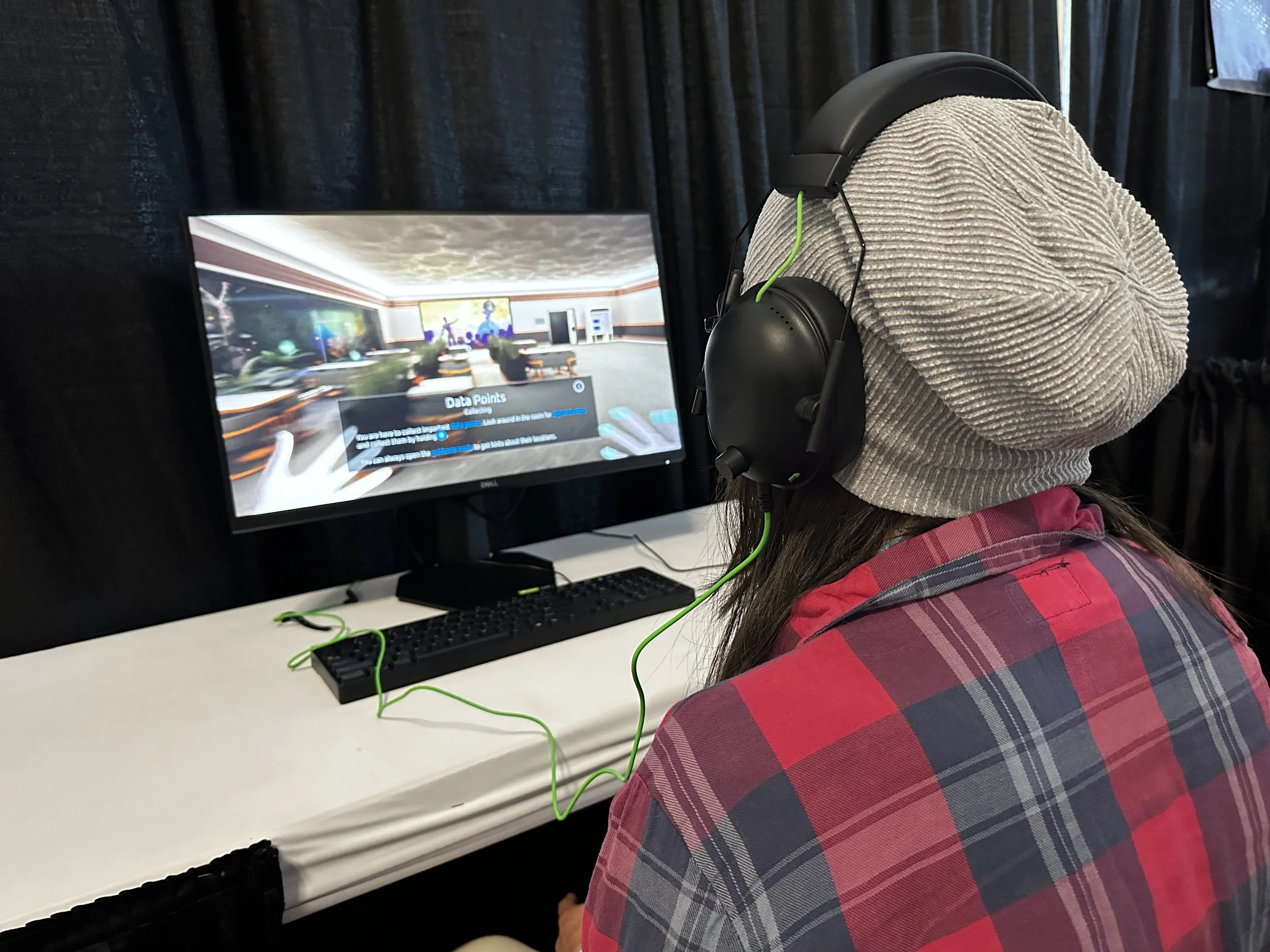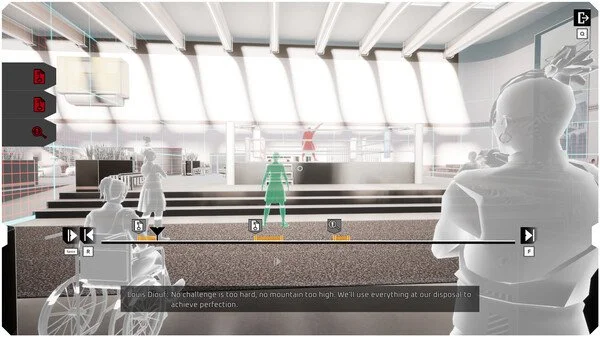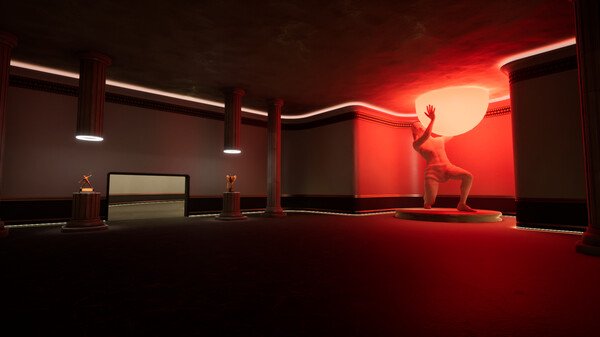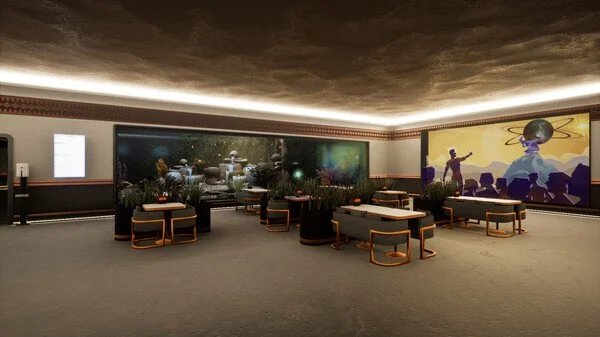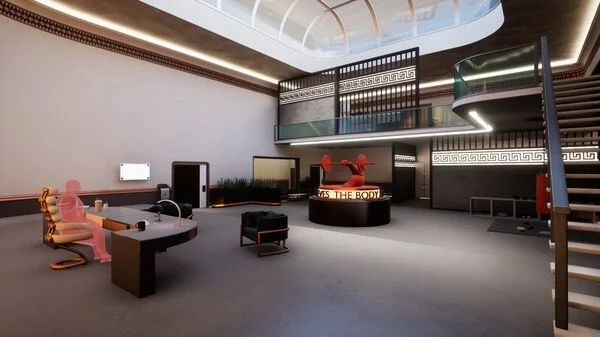BELONGING
Belonging, developed by the innovative team at Farbspiel Interactive, consisting of seven talented individuals based in Cologne, Germany, presents players with a surreal first-person experience. This captivating game delves into the enigmatic world of a cult that emerges during a pandemic.
Playing as a "Hacktivist," players seek to unveil mysteries within a deserted estate left behind by the Entelechism cult. This enigmatic group, known for their peculiar attire resembling Ancient Greek soldiers, has left behind cryptic clues and augmented reality remnants of real-life events. What truly elevates the gameplay experience in this game is the player's choice — to either safeguard the information and evidence they uncover or release it to the world for all to witness.
Belonging boasts a hyper-realistic 3D art style, accentuated by breathtaking graphics and immersive lighting effects. The combination of this lifelike visual style and expertly delivered voice acting immerses players in a futuristic detective narrative, making them feel like they're unraveling the secrets of a sinister world.
In a conversation with Alex, the founder and design lead at Farbspiel Interactive, it became evident that this experience transcends the boundaries of gaming. Belonging serves as a medium to raise awareness about the harsh realities faced by victims and survivors of cults in our own world today. Through the game's technology, the team is crafting a virtual museum that showcases real-world experiences, which will be offered as DLC following the release of Belonging.
I recommend Belonging to anyone seeking a futuristic, mystery-solving adventure. I was so engrossed in the narrative that, when I received the "Thanks for Playing" message, I momentarily forgot I was playing a demo. I eagerly anticipate the full release of this extraordinary experience, set to arrive early in 2024 on PC.
Taz: Alright, this is Taz, day three of PAX West in the summit building doing an interview with Alex from… Farbenspiel Interactive. Did I nail it?
Alex: (laughs) That’s pretty good.
Taz: Oh, sweet (laughs). I'm here with Alex. Please feel free to introduce yourself.
Alex: Okay. Hi, I'm Alex and I'm the owner and CEO of Farbenspiel Interactive.
Taz: Perfect. What originally got you into this idea? Or even like, gaming in general? Or even indie games at that point?
Alex: So I've been doing work in the industry for about eight years now. I started off with doing press stuff, like yourself. And at a certain point, I got to meet someone who was making a game that I played my whole childhood and that was the moment I realized, “Oh, you can also make games.” Then, I bounced around the industry a little bit. I finished my studies in media management. And yeah, I afterward worked for a small indie company in Germany for three years. Then, I worked for another company that swept three games for a very short while. And afterward, I basically jumped into this project full force to fulfill my dream of making a game with social impact.
Taz: Wow, I love social impact, especially what's going on in today's world. But also brings some fun entertainment and a nice story as well. And where are you all based out of?
Alex: We are based in Cologne, Germany, which is like central Germany, home of Gamescom. Some people might have heard of it.
Taz: Oh, I didn't know that, actually. Cool, cool. So very far away from home. But we were talking earlier you said you don't feel homesick at all, or at least a little bit. Are you having a good time?
Alex: Yeah. Lots of nice people here. It's very different from other consumer-driven conventions because there's a lot more community stuff happening here. And I very much enjoy that.
Taz: Yeah, speaking of community, I see that you have a nice, beautiful rack of companies, cards, and games from other people. Tell me about that.
Alex: So, not everyone has the privilege to travel overseas, and I decided to take some of the other indie companies from our region and Europe in general, that wanted to share their games and put them out here at PAX. A lot of success so far because people just enjoy finding new games. And yeah, I'm just happy to share the privilege.
Taz: Yeah, that is actually a very new experience that I've seen. I don't see a lot of people sharing or bringing stuff from home to here and be like, “Hey, there's also this game, this company, that could make it out here, give them a try.” It's very community-oriented.
Alex: Which I think is the strength of indie games, that we definitely want to help each other out where we can.
Taz: Mmhm. So, Belonging, tell me a little bit about Belonging.
Alex: So it's a first-person narrative adventure where you dive into the abandoned estate of a cult, and you have to find out why the people that previously lived there disappeared. You collect evidence in the form of digital remnants — so small video recordings, audio recordings, and text form — and you find out what actually happened to the cult and also why a lot of people have joined this cult. In the end, you have to make a decision on what information you will leak to the outside world and who will be made responsible for what happened to the cult and its members.
Taz: Hm.
Alex: We're trying to raise attention to the topic of how cult survivors these days are treated and how it's important to be empathetic towards the situations in which people join, like, these organizations or fall for cult-like narratives. And yeah, that's the goal of the game, basically.
Taz: Yeah, love it. About how long is the game?
Alex: So we're aiming for five to six hours. This is a game you're supposed to play like in one sitting. Just so the narrative really, really sticks with you. Yeah, but that's the general idea.
Taz: Yeah. Wow. How long has this been in development?
Alex: So we start with research in 2021. We had a lot of, well, it's a very serious topic, so we have to be careful and talk to like university professors and organizations in Germany that work with cult survivors. And yeah, ultimately, we started working on the game itself in full production in March this year.
Taz: Wow. Wow. And what does the timeline look like if that is public information in terms of release or demos or things like that?
Alex: So it's actually coming out at the beginning of next year.
Taz: Oh, okay.
Alex: We work very fast with what we do.
Taz: Yeah! And do you mind you're telling me how many people are on your team?
Alex: Seven, right now.
Taz: Oh, seven. Is there a mix of artists and programmers and things like that? Or have you had to outsource sometimes here and there?
Alex: We have to outsource. So, basically, internally, we have a writer, a programmer, a lead programmer, a technical artist, a 3D artist, and two 2D artists. And Externally we have our composer, Kim, and another sound engineer who is basically doing the sound implementation.
Taz: Okay. Right on. And, you mentioned Kim and yourself, how many other people from your team are here?
Alex: No one (laughs).
Taz: (laughs)
Alex: Like I'm all by myself this time. We recently had Gamescon where everyone still has to recover. Gamescom was literally on the 28th – it finished up on the 28th of August, which was about a week ago.
Taz: Oh wow. Yeah.
Alex: So I did like the one-two punch. Getting straight from Gamescom on a plane to Seattle.
Taz: Wow. Love that.
Alex: It’s quite the experience so far.
Taz: Is this your or the game's first PAX West or PAX in general?
Alex: Yeah, it's my first PAX in general. The game’s as well. Kind of obviously, since we started developing in March, we didn't even have the time. But, yeah.
Taz: Yeah, wow. I love the energy. I love seeing you start development in March and then now you've knocked out – yeah, one-two punch – two conventions within less than a month's time.
Alex: (laughs)
Taz: I can't imagine how exhausted you are. But I love the energy. You're very welcoming. I do love seeing that. One more funny question or fun question: If you go back in time and give yourself some advice before – whether it'd be with Farbenspiel or the game itself – what advice would that be?
Alex: Oh, boy. So, planning the production of the game is a complex thing. And you should always make sure that there's enough room for mistakes because otherwise, you will end up in a very uncomfortable situation. Like, buffer zones aren't optional when making games because games are a very complex medium. You’re bringing in sound, you’re bringing in graphics, and bringing in a little bit of film knowledge as well, I guess – because you have to think about cinematics and everything. And assuming that that will go by without like, one tiny bump in the road is hubris.
Taz: Yeah, okay, that's some good advice. That's crazy. So, what got you inspired? You're talking about a little bit of film knowledge and getting all this stuff under wraps. I'm looking at the game right now, it's a first-person experience. Was that always the plan or what was the original layout? What did that look like?
Alex: It was always the plan to make this a first-person narrative adventure. I've been heavily inspired by Tacoma. Not the city of Tacoma, I recently found out (laughs).
Taz: (laughs)
Alex: Not the Toyota Tacoma, but the game Tacoma. And yeah, basically it was always supposed to be a first-person narrative adventure. A couple of things have changed: The game was originally called Foreclosure and you were supposed to make the rounds through the estate and foreclose them.
Taz: Oh!
Alex: So, you find out the values that they have accrued and that the criminal aspect of the cult basically was weighed out and weighed up in money. But balancing an economy around morals is absolutely impossible.
Taz: Yeah.
Alex: Well, it's it was out of scope (laughs). But it was also like, how much worth do you put against attempted murder? Or like, it’s well, it gets… Yeah.
Taz: (laughs)
Alex: There are some ways to do that, but not in a very sensible way.
Taz: For sure, for sure. Well, that's all the questions that I have. I'm excited to try out the game. This is your time to shout yourself out shout the game where can we find you, the game, release dates, things like that?
Alex: So you can always find Belonging on Steam. You can wishlist us there. There are also links to our Discord, our website, and everything you need to know. What I would like to mention is that we also have a social project connected to this where we use the technology we have created in the game to create a social museum that will be released for free with the release of the game. We want to basically have an exhibition of our community and people attached to our community where we want to highlight stories of how people have encountered cults in their lives, to find solidarity, and to break the taboo of talking about this topic. Especially since the pandemic started, I feel that a lot of people have encountered the topic, sadly, and it takes a lot of a lot of strength to try to reconnect with friends, family, or acquaintances who have fallen from cult-like narratives. And we hope that this project will help those people see that they're not alone. And yeah, we'd love to have everyone that can participate – like no story is too small. This is not about sensationalizing trauma. This is mainly about seeing that there are a lot of people that have encountered this.
Taz: Wow, heavy stuff. But it's amazing to see that you are able to produce a game in such a short time and then even, on top of that, build social awareness of this issue – that I didn't even really know was an issue because it's like kind of buried under some stuff. I’m glad that this is able to bring that stuff up. That's amazing. That's crazy.
Taz: Alex, thank you so much for taking the time. I really do appreciate you. I hope you have a good rest of your PAX and I'll see you around, I'm very excited to try out the demo.
Alex: Thank you. I hope you enjoy.

